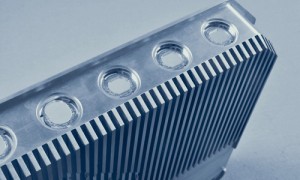Is Aluminium suitable for machining?
Views: 799 Update date: Apr 10,2024
Yes, aluminum is generally suitable for machining. It is a widely used material in machining processes due to several favorable properties:
Softness: Aluminum is relatively soft compared to many other metals, making it easier to machine.
Good Chip Formation: Aluminum alloys typically produce long, stringy chips rather than breaking into small, sharp pieces, which can help in the machining process.
High Thermal Conductivity: Aluminum conducts heat away from the cutting zone relatively well, reducing the risk of heat-related damage to the cutting tool.
Corrosion Resistance: Aluminum is naturally resistant to corrosion, which can be beneficial for many applications.
Gumming: Aluminum can sometimes "gum up" on cutting tools due to its tendency to adhere to surfaces. Proper cutting fluids and tool coatings can mitigate this issue.
Work hardening: Certain aluminum alloys can work-harden during machining, which can affect the machinability and require adjustments in cutting parameters.
Material Removal Rate: Due to its softness, high-speed machining can sometimes lead to excessive material removal rates if not controlled properly.
Overall, aluminum is a widely used material in machining operations, particularly in industries such as automotive, aerospace, and electronics, where its combination of properties makes it an attractive choice for a variety of applications.
Prev: Which manufacturing type is used where product volume is very low?
Next: What are the methods of machining Aluminium?
Softness: Aluminum is relatively soft compared to many other metals, making it easier to machine.
Good Chip Formation: Aluminum alloys typically produce long, stringy chips rather than breaking into small, sharp pieces, which can help in the machining process.
High Thermal Conductivity: Aluminum conducts heat away from the cutting zone relatively well, reducing the risk of heat-related damage to the cutting tool.
Corrosion Resistance: Aluminum is naturally resistant to corrosion, which can be beneficial for many applications.
Lightweight: Aluminum is lightweight, which can be advantageous for applications where weight is a concern.
Gumming: Aluminum can sometimes "gum up" on cutting tools due to its tendency to adhere to surfaces. Proper cutting fluids and tool coatings can mitigate this issue.
Work hardening: Certain aluminum alloys can work-harden during machining, which can affect the machinability and require adjustments in cutting parameters.
Material Removal Rate: Due to its softness, high-speed machining can sometimes lead to excessive material removal rates if not controlled properly.
Overall, aluminum is a widely used material in machining operations, particularly in industries such as automotive, aerospace, and electronics, where its combination of properties makes it an attractive choice for a variety of applications.


